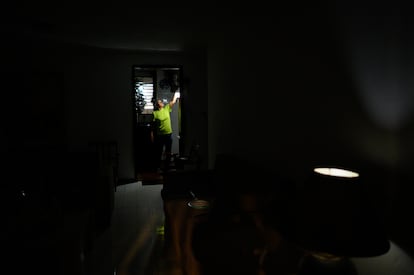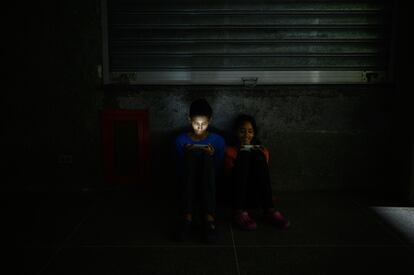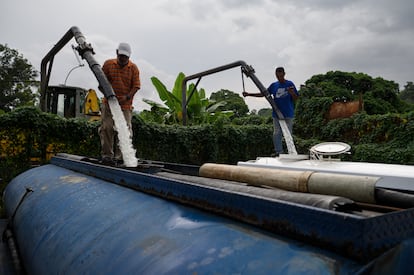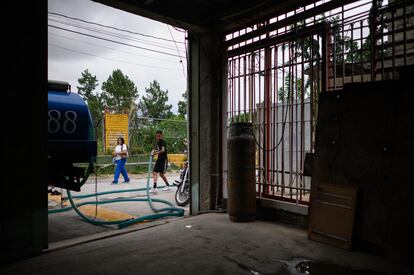Caracas: The ordeal of living in a city with failed public services
The capital of Venezuela isn’t able to escape the precariousness being suffered in the rest of the country. Large sectors of the city go without water, while residents live with constant blackouts and electricity rationing


A valve hidden under a sidewalk is closed and opened every week by an official from the state company that provides water to Caracas. The water supply of thousands of families in the Venezuelan capital is in the hands of public servants like him.
Residents live with the rationing of both electricity and water. They have to break the laws of physics to try to do what should be done over the course of a week in just a couple of days: bathe, wash clothes, water the plants, clean and cook. Under the agreements in their neighborhoods or condominiums, they receive between 30 minutes and an hour of water or electricity at a time. If a single pipe breaks down, everything can change. If the power fluctuates too much or goes out permanently, they’ll be disconnected from the internet and cable. Every day in Caracas begins with this uncertainty.

One day last week, a few feet from that valve, in a middle-class neighborhood, two police officers were replacing the dead traffic lights. They waved their arms to break up the traffic jams on El Cafetal Boulevard — a neighborhood full of elderly people — where a stretch that covers about eight buildings had been left without power. Residents surrounded a crane, which was bringing a second emergency generator to give them three-hour shifts of power. The enormous device had the nickname “La burra” (“female donkey”) scrawled on it in marker.
Such operations have become routine. The city’s transformers either explode or stop working as they are so old. The electricity company — owned by the state — patches up the damage caused by each breakdown as best as it can.
In a small meeting on the street, personal tragedies caused by the collapse of the public service infrastructure in Venezuela are shared. Among the causes is the lack of maintenance and investment in modernization but, above all, the culprit is corruption. José Antonio Rodríguez says that he left his 90-year-old mother with a battery-powered radio to distract herself, since he cannot move her somewhere that has electricity and water. Carolina González, meanwhile, is worried about her inventory of cupcakes, which may go bad in her unlit freezer. She lives from this business — she prefers to fry the cakes and sell them at a discount, rather than lose them due to a blackout.
During the first few hours of the day, in her capacity as the neighborhood manager, González has already coordinated the connection of a cable from one building to another, so that the residents can charge their phones. She has also made sure that a resident who’s surviving with an oxygen cylinder is taken to another place.
Hugo Pimentel, another resident, doesn’t stop for long to talk. He quickly returns to his apartment to monitor the operation of the tiny generator that he bought 15 years ago for his beach house. It has now been converted into a large cell phone battery in the hallway of his building.
The neighborhood’s residents have just gone through 22 days without water due to a broken pipe. And, when the pipes began to fill up, the power went out: the pumps to open the taps no longer worked. “When we talk about this, nobody believes us,” sighs Senith Ocampo, a 69-year-old widow who ran out to look for ice so as not to lose the week’s groceries. But the story is retold almost every day in Caracas, as well as in many other Venezuelan cities. “You have to do a lot of work,” adds Virgilia Romero, with a fish and frying pan in one hand and a pot in another, while standing in front of her neighbor’s door. Romero, 69, cares for a 92-year-old woman. With no electricity, she has to knock on doors, looking for a gas stove to be able to cook. She also has a job in Mariches, the shantytown where she lives. There, the water only arrives every two months.

The breakdown in public services is one more dimension to the crisis that Venezuela is experiencing. That’s why there’s an agreement so that part of the government’s resources abroad can be unfrozen. The administration of Nicolás Maduro wants to get hold of these gold and cash reserves as soon as possible: the Venezuelan president has made it an unconditional stipulation for negotiations with the opposition, which in turn has demanded that these funds — if released — be allocated to improving the supply of water and electricity.
These are the two public services that are in the most dire state and most affect the quality of life. The mood of many Venezuelans is devastated when they arrive home and see the clocks on their appliances flashing — a classic mark left by a blackout that disconnected them for a few hours. Or with each power cut that makes light bulbs, televisions and fans creak. A single fluctuation in the electrical current can turn everything off.
Venezuelans are all connected by the same anguish. Many fear a massive general blackout like the one that hit the country in 2019, or when half of Caracas is left without water for more than a week, because one of the utility branches that supplies the city has broken down. During a routine situation like this, people have to wash their dishes and faces with water collected in tubes or buckets. In a country that has 7.7 million migrants abroad, there are those who think about leaving every time this happens. “Here, we’re prepared for a war. We know how to survive,” Carolina González affirms.
It wasn’t always like this. “Twenty years ago, 80% of the city received continuous water every day, at all hours. We may have the same amount of people or less… but now, only half the water arrives. It’s not enough. We also had robust electrical and telecommunications systems managed by model companies. But a process of vertical, progressive and profound deterioration took place,” explains engineer José María De Viana, in an interview with EL PAÍS. In an academic text, he has written that “the deterioration of public services is the most tremendous dimension of poverty, since citizens cannot change that reality. The particular provision of a public service will only be possible for those sectors of society with the highest income.”
In the interior of the country, this deterioration is worse. It comes with more extreme forms of electricity rationing. In the state of Mérida, for instance, the public administration has long reduced its hours of operation to save energy. However, these measures, which have now come to Caracas, weren’t always the norm in the capital. The imagined privilege of Caracas — the idea that the seat of power was insulated from the crisis and offered more opportunities — stimulated an internal migration of Venezuelans from the rest of the country, in search of better conditions. This phenomenon led to many social tensions. And, with the continued deterioration, life for a large part of Caracas residents no longer exists within a bubble.

Spending a few hours at a water station is enough to put an end to the mirage. Sixto started in the business eight years ago, when he left his neighborhood in western Caracas. He bought some land in a mountainous area on the outskirts of the city and built his own house. He bought a truck to supply himself with water, before quickly realizing that he could also supply his neighbors. Today, he has four vehicles and several permanent clients, including a residential complex of about 200 apartments near the nightclubs, luxury towers and restaurants of the Las Mercedes neighborhood. Every week, this complex alone buys 20 shipments of 10,000 liters of water from him, at $50 a truckload.
Sixto dispatches trucks to thirsty neighborhoods and even fills up swimming pools in wealthy areas. There are sectors of the city that have practically been disconnected from the aqueduct, as they are supplied only by tanker trucks, which have become basic necessities in the family budget.
The government has imposed a new system to regulate this private water shipment business. In order to purchase supplies of water and fill up their tanks, truck drivers must make one or more “community deliveries” for free. In exchange for a pro-bono trip to an area that hasn’t received water for days — it could be a whole neighborhood, or perhaps the house of a person without power — a water delivery company is given authorization to make another three trips to private clients. This is how the authorities are trying to manage the shortage.
Even when they have no electricity amid the suffocating heat, several businesses have forced themselves to stay open. There is pressure to make any kind of sale in the grip of the recession that’s hitting the country again, after a slight rebound in the economy was recorded last year. “We cannot close,” says José Solórzano, the owner of a hardware store, as he rushes to install a small generator for emergency power, which he rented from another business in the area.
After the power is back on, Solórzano and his appliance repair technicians play dominoes, between receiving clients who bring in equipment that has been damaged by the outages. As the men move the black-and-white pieces around, they mention that refrigerators, televisions and air conditioners are the electronics that suffer the most from the unstable current in Venezuela.
During the latest power failure last week, the residents of El Cafetal remained in the dark for five days. “We’re living like animals,” José Antonio laments. He’s tired of having to go up and down several flights of stairs each day, while the elevators are out of service. Nobody has arrived to supply diesel to the emergency generator, nor is there any news about a timeline to restore the power.
Sign up for our weekly newsletter to get more English-language news coverage from EL PAÍS USA Edition
Tu suscripción se está usando en otro dispositivo
¿Quieres añadir otro usuario a tu suscripción?
Si continúas leyendo en este dispositivo, no se podrá leer en el otro.
FlechaTu suscripción se está usando en otro dispositivo y solo puedes acceder a EL PAÍS desde un dispositivo a la vez.
Si quieres compartir tu cuenta, cambia tu suscripción a la modalidad Premium, así podrás añadir otro usuario. Cada uno accederá con su propia cuenta de email, lo que os permitirá personalizar vuestra experiencia en EL PAÍS.
¿Tienes una suscripción de empresa? Accede aquí para contratar más cuentas.
En el caso de no saber quién está usando tu cuenta, te recomendamos cambiar tu contraseña aquí.
Si decides continuar compartiendo tu cuenta, este mensaje se mostrará en tu dispositivo y en el de la otra persona que está usando tu cuenta de forma indefinida, afectando a tu experiencia de lectura. Puedes consultar aquí los términos y condiciones de la suscripción digital.








































